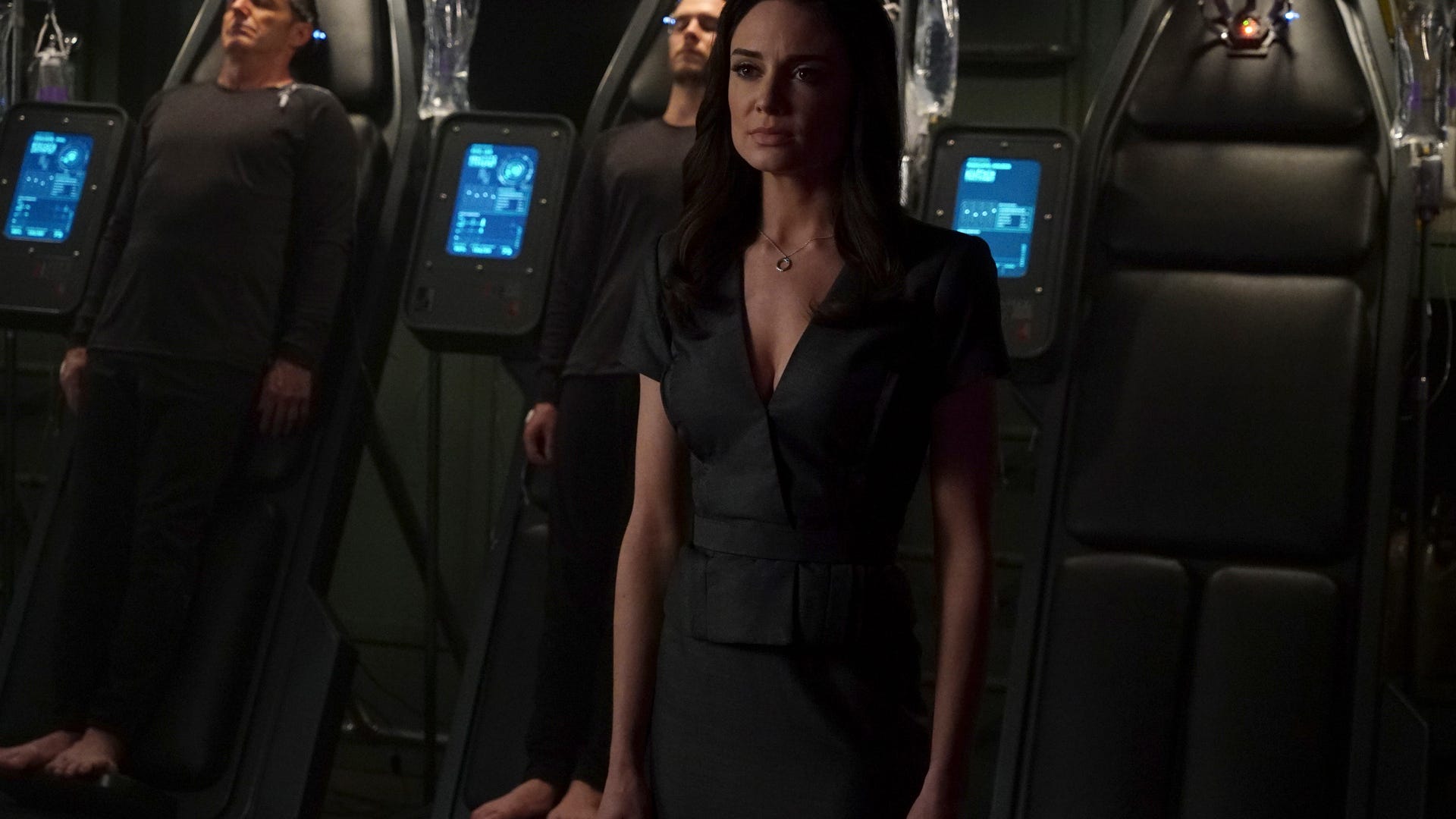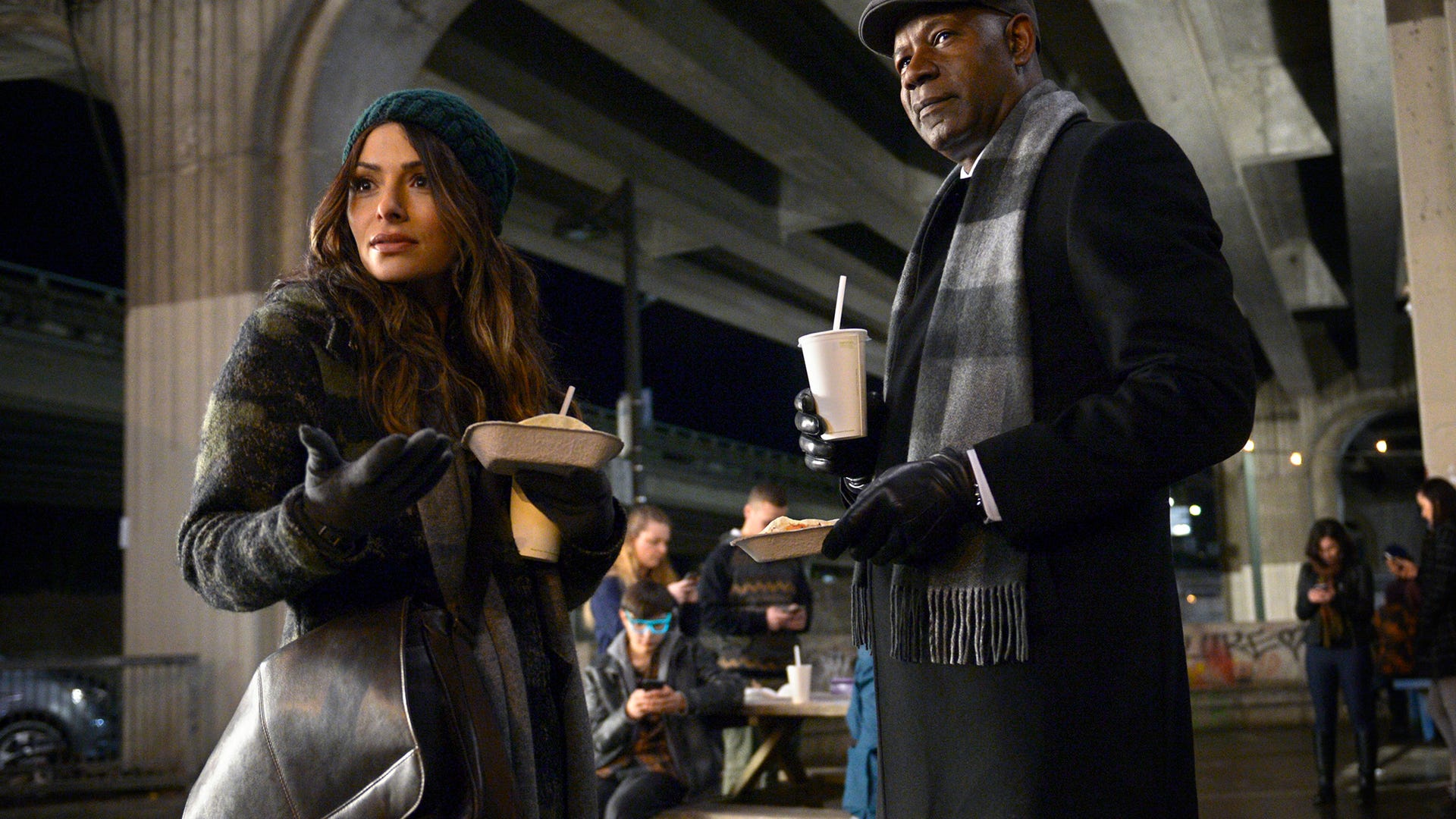Join or Sign In
Sign in to customize your TV listings
By joining TV Guide, you agree to our Terms of Use and acknowledge the data practices in our Privacy Policy.
Why Is TV So Obsessed With Virtual Reality?
Virtual heavens lead to reality hell
Somebody call Neo: virtual reality landscapes are once again the hot new thing, in life and in media. And just as The Matrix helped redefine our view of virtual worlds way back in 1999, television's newest trend paints the rebooted tech with an air of menace.
But why? And why now? What is it about virtual reality that, decades after the technology was first introduced, TV has embraced the technology whole-heartedly for major storylines on network, and cable? We've got a few ideas in that direction, but first let's talk a quick look back through the complicated history of virtual reality, and its existence (eXistenZ?) in media.
Naturally, whenever any new technology hits the market, Hollywood tries to integrate and grapple with it, often with mixed results (look for Rise of the Fidget Spinners to hit theaters some time next Fall). The hacker thrillers of the 2000s proved there's nothing less exciting than actors furrowing their brows while furiously typing on computers. Arguably, it took another decade and a half until Mr. Robot figured out how to make hacking into gripping entertainment, and that's mostly due to a focus on characters over computers; married to a slick, visual style helmed by show creator Sam Esmail.
VR is the same. Way back when, we were semi-terrified by a pixelated James Fahey in Lawnmower Man, while The Matrix movies mostly used the idea of virtual reality to talk about bigger questions of humanity tied to epic, gravity-defying action sequences. But the tech IRL was bulky, and generally tied to the fading business of arcades: the novelty wore off, and even Nintendo's attempt to make VR a household name with the Virtual Boy ended as a one-off quirk a la the ill-fated Power Glove.
Cut to 2017, and a crowded entertainment space has driven tech companies towards new ways to innovate. Google helped spur things on with their ultra-cheap Cardboard platform*. Then enter Samsung, pushing the tech heavily with their phones, and Sony doing the same for PlayStation. VR is no less dorky looking (seriously, there's no way to use one of the current headsets without looking dumb), but it is back.
[*Interestingly, Mr. Robot was one of the early television adopters of Cardboard, crafting a mini-episode of the show that took place between seasons that is easily the most compelling VR narrative to date.]
While major tech companies are selling VR as a way to explore other worlds (Swim with whales! Watch a sunset! Eat a virtual sandwich!), television has instead looked at the technology as a platform for malicious intent. Particularly, the past few weeks of TV have shown a surprising amount of virtual worlds gone bad.
The CW's The 100 got an early start on the trend last season, with a rogue computer program responsible for the nuclear irradiation of planet Earth aiming to go for round two. The program -- named A.L.I.E. -- used communion wafer style microchips in order to upload the post-apocalyptic survivors into a virtual "perfect" world. The cost? Their individuality, and some of their less savory memories. Join the perfect virtual world, and all you'll lose is your humanity!
The 100 finale: all those major twists, explained

Mallory Jansen, Marvel's Agents of S.H.I.E.L.D.
ABCAgents of S.H.I.E.L.D. tried a similar tactic during their season closing arc this past year. After building a L.M.D. (Life Model Decoy) named Aida in order to help usher his dying former assistant in a virtual paradise, mad scientist Holden Radcliffe (John Hannah) witnessed his creation, and VR world, go rogue; as sci-fi robots are wont to do. Aida removed one "regret" from every member of the S.H.I.E.L.D. team, causing some of them to go evil; and turning the world into an dark alternate reality where the villainous organization HYDRA had taken control.
[Side note: both arcs on The 100 and S.H.I.E.L.D. shared a key guest star/secondary antagonist in actor in Zach McGowan. Perhaps he's the secret ingredient to making your VR-focused story work?]
The past few weeks, Doctor Who has pivoted off a popular internet meme/philosophical argument that we are, in fact, in a computer simulation right now. What would happen if we found out the truth? That nothing matters because every single person on Earth -- from the President of the United States, to the scientists at CERN -- are just an alien created simulacrum of the real Earth, made in order to plan the perfect invasion. Whether you're the program, or in the "real" world, you're damned if you do and VR-damned if you don't.
Doctor Who plays Let's Make a Deal, with serious consequences
And over on Starz, American Gods has painted virtual reality as the dark tool of new, modern gods. It's mostly a way for them to communicate from far distances, but the device used carries a malevolence to it. Curled like a larval face-hugger out of the Alien movies, the tech unfurls with mechanical clicks before leaping through the air to attach to its victim's face, plunging them into the virtual lair/limo of the nasty, dangerous Technical Boy (Bruce Langley).
It's not all bad news for VR. It's Always Sunny in Philadelphia had a reliably ridiculous episode this past season that found Mac (Rob McElhenney) and Frank (Danny DeVito) obsessed with a grittily realistic war game. More than a comment on the technology, it played to the character's addictive personalities and general over the top anger. This included a real world element -- a VR game named "Project Badass" -- that paired viewers with Mac on a suitably ridiculous adventure. Crackle's Snatch is taking a similar angle, releasing a VR chapter designed to bridge Seasons 1 and 2 of the show that will allow viewers to interact with Rupert Grint and the rest of the cast.
But for the most part, VR is still the enemy. NBC is launching an ambitious sci-fi series next season titled Reverie, starring Dennis Haysbert and Sarah Shahi as a behavioral expert tasked with pulling people out of far-too-real virtual reality worlds. No one off, this is virtual reality as the main, driving antagonist of the series.

Sarah Shahi, Dennis Haysbert; Reverie
Sergei Bachlakov/NBCBut why? Beyond us fearing new technology, and writers always looking for new ways to play humans against tech (can you imagine a science fiction story where some new tech got introduced, and absolutely nothing went wrong?), why has VR captured a place as the villain du jour?
It may have something to do with the constant push and pull between the horrors of every day life -- fraught political tensions, the threat of terrorism, gun violence and more -- and the urge to escape. Don't get distracted! Don't look away! Some people scream, and these stories may touch on a similar impulse: don't get too sucked into pretend worlds, when the real world needs your help.
If that's the impetus, it's fair to say there's a bit of guilt on the part of television writers creeping into the mix. While the world burns, they're offering up frothy entertainment that walks the line between escape and social commentary. They're a cog in the machine that feeds the opiate of the masses: they're part of the problem. Just as their characters get distracted by virtual reality and pay the price, so are we, in the real world, paying the price for spending more time bingeing the latest streaming show than heading to the streets and marching for the cause of our choice.
Or it's simply possible that with major global companies ponying up money for advertising their VR headsets, the technology is top of mind. Just like the first time we thought VR would be the next big thing, nearly two decades ago, companies are once again all in on the gizmos. With the idea of virtual reality omnipresent, it was only a matter of time before it became a trend. Parallel writing -- where two writers develop the same idea, execute that idea, and it seems like one plagiarized the other -- is a real thing that happens all the time. Essentially, there's a way to make the "VR is evvvvvviiiiillll" idea work, and so multiple TV shows ran with the idea in a similar way.
That's no fun, though, so let's offer a third option. To take the first idea and flip it around, sci-fi, even when it's showing off the grimmest of circumstances (hello, The 100!) always has a tinge of hope. It's easy to take a new technology and corrupt it as a plot line; but it always starts (and sometimes ends) with the best of intentions. Dramatically, it's more interesting to have something go wrong, as we discussed earlier, than have it all go right. So you start with that gem, that idea of hope. You figure out a way to corrupt it. And then see what's left at the end.
In most of the storylines, the tech isn't the real villain (except for what seems to be happening in Reverie, TBD): an outside force takes the purity of the technology and twists it to vile ends. Both A.L.I.E. and Aida's programming begins with the idea of creating heaven, but through machine logic it gets turned into Hell. On Doctor Who, it's gross looking alien things, but gets even closer to the metaphor: they may (or may not) be angels, who have created paradise in order to "benevolently" rule humans.
We'll see how that all turns out for The Doctor and his Companions (the final part of the story airs this weekend of BBC America), but the underlying current is there... Virtual Reality isn't the enemy. It offers a view of beautiful new worlds without leaving the comfort of our homes, a way for our mind to transcend the slowly rotting shell of our bodies. To have all scars disappear, and to lose the guilt and constant self doubt that comes with the burden of non-virtual reality.
Viewed on its own, without interference, VR is Heaven. Whether you believe in religion or not, an afterlife or not, the idea offers comfort. And the connection to the real world is, well, real. You may never be able to upload your mind a la Black Mirror's highly lauded "San Junipero," or the virtual worlds offered by any of the shows we mentioned above. But in real life, you can get close. Ultimately though, lurking around the edge of your vision, is the enemy: the real world. In life, you'll always have to return. But in science fiction? On TV? You can live in paradise forever.
Just be wary of robots with bad intentions.
